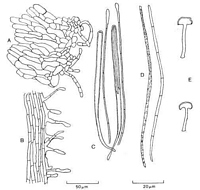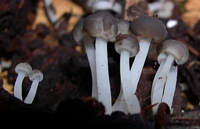|
 Vibrissea albofusca Vibrissea albofusca
BiostatusPresent in region - Indigenous. Endemic
Images (click to enlarge)
Caption: Fig. 1 Vibrissea albofusca. A: Cells of ectal excipulum with superficial hairs. B: Cells of
stipe cortex with superficial hairs. C: Asci and paraphyses. D: Ascospores. E: Two
apothecia in longitudinal section showing plane (top) and umbilic | 
Caption: Fruiting bodies about 10 mm high
Owner: P.R. Johnston |
Article: Beaton, G.W.; Weste, G. (1983). A new species of Vibrissea from North Island, New Zealand. New Zealand Journal of Botany 21(3): 281-283 (http://www.rsnz.org/publish/abstracts.php).
Description: Apothecia gregarious, scattered or caespitose, stalked, very variable in size but up to 30 mm
high when fresh; pileus variably hemispherical, to 4 mm diam. when dry; hymenium to 270
µm thick, totally covering the upper surface of the pileus, smooth, slightly glistening and
variably dark brown when fresh, drying velvety black and often mottled white with extruded
ascospores; ectal excipulum either plane or umbilicate around the stipe, concolorous with
stipe or darker, on some apothecia scurfy when dry, of variable structure and thickness,
composed mainly of an hyaline textura prismatica with cells to 35 x 15 µm mostly lying at a
high angle to the surface and with a narrow superficial layer of smaller ellipsoidal to
irregularly shaped cells and variably distributed superficial hairs, obtuse, 2-7 celled, to 50 x 5
µm; medullary excipulum of interwoven, hyaline, thin-walled hyphae to 10 µm diam.
immersed in a colourless gelatinous matrix; subhymenium an ill-defined layer to 35 µm thick
of thinner and more densely interwoven hyphae; stipe cylindrical or slightly tapering, some
expanded basally, at first white and smooth, drying greyish orange and in some areas scurfy
under low magnification, of variable length and to 1 mm diam. when dry, composed of a
medulla of a thin-walled, hyaline textura prismatica with cells to 55 x 10 µm and some
gelatinous content, and a cortex to 185 µm thick of a more compact textura prismatica with
cells mostly c. 30 x 8 µm and an uneven covering of superficial hairs, obtuse, thin-walled,
uneven, mostly 2-4 celled, to 45 x 4 µm. Asci cylindrical with a tapering stalk, thin-walled,
thicker apically, small pore J + in Melzer's, with 8 spores in a fascicle, 195-225 x 7.5-8.5 µm.
Ascospores cylindrical, apically obtuse, tapering basally, at first multiguttulate, most spores
becoming 7-septate, 95-115 x 1.5-2 µm. Paraphyses cylindrical, septate, simple or branched basally, 2-2.5 µm diam., tips expanded to
4-6 µm, 20-30 µm longer than the asci.
Notes: Apparently not uncommon on various types of dead wood in wetter areas in the North Island,
New Zealand during May-July. When fresh readily separated from the other species of
Australasian species of Vibrissea by the combination of dead white stipe and variably brown
pileus.
|